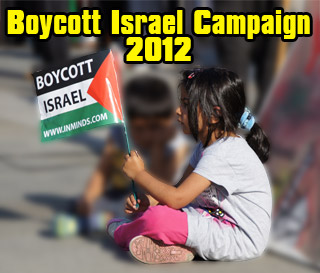
 Innovative Minds © 2014. All Rights Reserved. www.inminds.co.uk | ||||
|
[Boycott - Economy and Trade News] Public strikes could paralyze IsraelPress TV Israeli public workers have launched a strike that threatens to bring the economy to a halt in a dispute over a 10 percent pay rise. The open-ended general strike, which began early on Wednesday, will affect 600,000 central government and municipal workers, except at the Zionist war ministry. According to media reports, the strike went ahead after the national labor court rejected the pay rise demands of the Zionist regime's largest labor union, Histadrut. During the strike, ports will shut down, delaying exports and imports while public offices will be closed and the railways will not operate. Hospital services will also be disrupted and the electric company and firefighting services will work on an emergency footing only. Bus services, refineries, the water company and the courts will not operate as well. Histadrut has been demanding a 10-percent pay rise to compensate for several years of freezes, while the government is offering only about one percent.
Manufacturers could lose NIS 1b.(£115mil) a dayMatthew Krieger, The Jerusalem Post The Histadrut Labor Federation's general strike set to start on Wednesday morning will cause almost NIS 1 billion in losses a day to the country's manufacturers, industry leaders said on Tuesday. "If this strike lasts seven or eight days, manufacturing companies could be looking at losses of some NIS 7b.," said Uriel Lynn, president of the Federation of Israeli Chambers of Commerce. "Not only will they suffer from severe direct losses, but there will also be significant long-term repercussions on production levels as raw materials needed for manufacturing are not going to be able to come into the country." Manufacturers Association of Israel President Shraga Brosh met separately on Tuesday with Histadrut Chairman Ofer Eini and Finance Minister Ronnie Bar-On in an effort to avoid the strike. Ahead of the meetings, he expressed confidence the labor action could be avoided. "I am going to do everything in my power to prevent the strike. I will talk with both parties with the intention of averting this strike, which would cause tremendous damage to the Israeli economy. The business sector and the economy cannot afford so much as an hour of strike," he said. Following the meetings, the Manufacturers Association said that nothing was certain, other than the fact that neither the Manufacturers nor the Histadrut wanted a strike. "We are still hoping to avoid the strike," said the Association, reporting no new developments coming out of Brosh's meetings. Brosh also noted that the strike would cause disruptions in electricity and fuel supplies, as well as a slow down in imports of raw materials due to the closure of the ports, which would shut down manufacturing lines. This, in turn, he said, was likely to delay exports, which would require manufacturers to compensate customers. Relations with export customers have already been strained this year, as workers at the Ashdod Port went on strike in February to protest working conditions and again in March over disagreements surrounding the awarding of outsourcing contracts, a strike that cost exporters some NIS 40 million a day and stranded an estimated $90m. worth of goods on ships outside the port and on docks waiting to be loaded. A general strike would be much more damaging to exporters. "We are looking at losses of some $100m. on the first day of the strike, and should the strike continue for five days, I estimate that it will cost our country's importers and exporters a combined $250m.," said David Artzi, chairman of the Israel Export Institute. "Even if they call a strike for one day, it's not really one day," he said. "One day of striking leads to three days of no movement in or out of the ports as it takes time, and significant money, to restart all of the country's port operations." According to Lynn, the Federation of Israeli Chambers of Commerce has asked the National Labor Court to issue an injunction against the planned strike. He added that while he did not oppose the right to strike, he objected to what he called a "solidarity strike." "This strike should not include workers who are employed at nongovernment-related places of work, public health employees, basic services employees such as electric and water, and also places where employees already enjoy high salaries, such as at the airports and seaports," he said. In addition to substantial financial damage, a strike by seaport employees would undo the hard work that export companies have done to built relationships with overseas customers, said Lynn. "The time that has been invested in building trust with customers will be totally gone, and to regain this trust is something very difficult to do," he said. The Manufacturers' Association told The Jerusalem Post that, ahead of the potential strike, manufacturers were conducting business as usual. "Export levels have not increased over the past couple of days from companies looking to ship products before the strike begins," said the Association. "There is nothing that we can do," Artzi said. "This strike is going to be very damaging not only to the export industry, but to the entire economy and many people are going to suffer as a result of it." Source: http://www.jpost.com/servlet/Satellite?apage=1&cid=1184766050203&pagename= JPost%2FJPArticle%2FShowFull
Officials: Mere threat of strike damages tourismNathan Burstein,, The Jerusalem Post Still recovering from last summer's war, Israel's tourism industry spent Tuesday preparing for another potential blow - this one self-inflicted. Industry representatives ranging from airline officials to tour operators expressed frustration bordering on dismay Tuesday as the Histadrut Labor Federation and the Finance Ministry continued negotiations over public sector wages, with a failure of talks potentially leading to a general strike and airport closure. The closure of Ben-Gurion Airport during a peak travel period would leave thousands of travelers stranded for each day of the strike, officials said, and would generate both millions of dollars in losses and additional damage to Israel's image as a tourist destination. "Sometimes I think we are our own enemies when it comes to tourism," said Ruth Ben-Tzur, the Tel Aviv-based general manager for Air Canada's Middle East operations. "I really believe we have the right to strike - I don't think we shouldn't have the right to strike - but the timing that's been chosen can really hurt the State of Israel, and that disturbs me very much." "I think it's a tragedy for the tourism industry if the strike lasts more than 12 hours," said Janos Damon, executive director of the Israel Hotel Managers Association. "It won't have a long-term effect, but it will spoil Israel's good name." But whether the country could claim a "good name" even if the strike were averted was a question eliciting varying responses, with some tourism workers saying that the mere threat of a strike damaged Israel's reputation among foreign travelers and companies involved in tourism. "There are the [potential] losses of millions of dollars per day, but the damage is also longer-range," said Jacob Lev-Ari, owner and manager of Shelly Tours. "If we have a contract with travel agents and wholesalers [overseas] and every half a year or year there's a strike, the travel agents won't want to work with us. We'll implore them to give up cancellation fees with this strike, but they can say, 'Why should I?' Why should they invest in promoting travel to Israel when this happens?" The industry's relatively rapid recovery from last summer's war is playing its own part, somewhat paradoxically, in compounding potential problems resulting from a strike. Fears of deep and lasting damage following the fighting proved unfounded, with the Israel Airports Authority reporting earlier this month that Ben-Gurion Airport was on track to process more passengers in 2007 than in any year but 2000, the best year ever for incoming tourism. But with flights entering and exiting Israel at near capacity, there's little that can be done to help tourists who lose their tickets in a strike. While airline officials said they were doing what they could to move passengers to flights departing before the airport closure began, their options were limited by the dearth of empty seats. And with the busy summer travel season filling flights worldwide, airlines are also less able to reassign larger aircraft to carry passengers delayed on trips in and out of Israel once a strike ends. Because strikes aren't covered by travelers insurance, most vacationers' losses won't be protected. Officials at El Al, Air Canada and British Airways said their companies would do their best to help passengers rebook affected tickets, but noted that the airlines aren't legally obligated to refund tickets lost in a strike, and that they're forbidden from bumping passengers on later flights to make room for those who've been delayed. While their immediate priority remains customer service, Israeli-based officials of foreign airlines said relations with their companies' overseas headquarters were also a concern. Though Ben-Tzur said that reducing flights to Israel had "never even crossed anyone's mind" at Air Canada, she added that the threat of a strike "puts me in an embarrassing situation." In contrast to the intifada, Lebanon war and wider regional problems that diminish travel to Israel, responsibility for a strike clearly lays with Israelis. "Airlines are a business, they're not philanthropic organizations," Ben-Tzur said. "Why should they put their equipment on routes where there are always problems?" "The name of our country for years was 'War Zone,'" Ben-Tzur said, "and when things recover a little, we close the airport. We are not yet a normal country, unfortunately, so we can't afford to act like other countries that have strikes. Italy can have strikes - millions will still run into the country the day after." Israel's situation remains different, she went on. "We're in such a marvelous situation that we can do this?" she asked. "It's ridiculous." Source: http://www.jpost.com/servlet/Satellite?cid=1184766055211&pagename= JPost%2FJPArticle%2FShowFull Also Of InterestPage URL: http://inminds.com/article.php?id=10180
|
|
Support Us
If you agree with our work then please support us.Campaigns INMINDS Facebook Live Feed Latest Video's
INMINDS Twitter Feed Tweets by @InmindsComFeatured Video's
You need Flash player 8+ and JavaScript enabled to view this video.
[all videos (over 200)..] Featured MP3 Podcast  "You cannot simplify the question of violence.. You look at human history - the American revolution, the civil war, the end of slavery in the United States, the African National Congress, the end of colonialism - by and large these were some combination of popular social uprisings and social movements and non-violent protests AND armed resistance. Now that doesn't mean I'm advocating for any armed action today, I'm not. I'm committed to finding ways of acting and speaking and making people laugh and doing art and disrupting the war machine in other ways, but I think focusing on violence when we have the comfort of being protected by mass of armed violence is not non-violence at all.. if you are pointing to the mass of violence and who's doing the mass of violence in the world today, you have to look to state violence - that's people bombing whole cities from the air.. " A founder of the Weather Underground, a revolutionary group that waged war against the US government in the 70s in response to the Vietnam War. Interview, Radio Neatherlands (TSWI) 30 June 2007 [12min / 6Mb] [all podcasts..] Newsletter Feedback |
 |
 |
















































